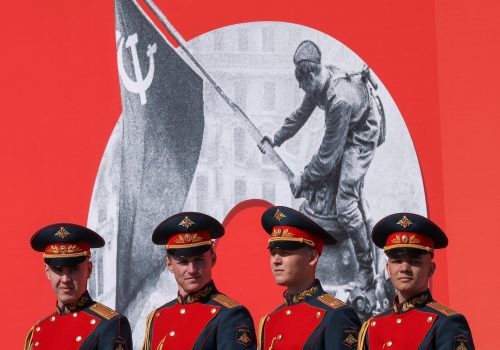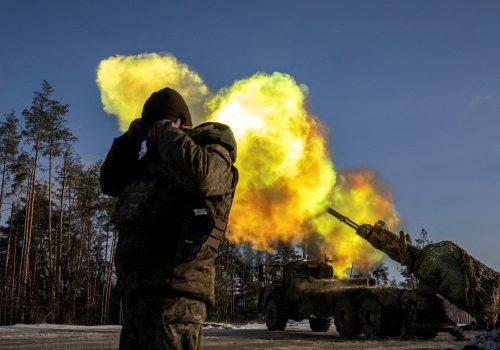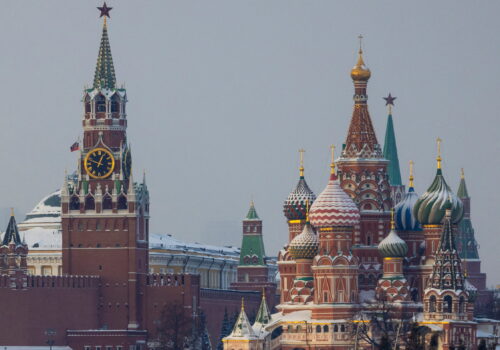Since the Kremlin’s large-scale invasion two years ago, no international crisis has received more attention than Russia’s now ten-year-old war on Ukraine. But much of the analysis and discussion has been focused on the war itself, in isolation, rather than the origins or drivers of the war. Russia’s war against Ukraine is part of the Kremlin’s broader revisionist design to control its neighbors and threaten democracy and global stability far beyond Ukraine. Moscow’s foreign policy thus poses an existential threat to Ukraine’s neighbors and to vital US interests.
Supported by its partners in China, Iran, and North Korea, Russia’s encroaching authoritarianism and revanchist foreign policy must be addressed as a concrete threat that, unanswered, could greatly jeopardize US national security and that of its allies around the world. This conference is designed to demonstrate prominent bipartisan and bicameral support for shaping and implementing a containment policy toward Russia as a necessary strategy to thwart and counter the Kremlin’s dangerous aims.
Since at least Putin’s infamous speech in Munich in 2007, it is clear that Moscow’s foreign policy is designed to restore Kremlin political influence across the political space not just of the former Soviet Union, but also the former Warsaw Pact states–meaning over many sovereign nations including members of NATO. Russia’s current foreign policy is also designed to weaken pillars of international security and stability, like NATO and the European Union. The Kremlin-directed cyber-attack on Estonia in 2007, Russia’s conquests in Georgia in 2008, its seizure of Crimea and hybrid war in Donbas in 2014, and major escalation of its war on Ukraine in 2022 are clear evidence of Moscow’s objectives. Russia has worked closely with Iran to promote instability in the Middle East, including in Hamas’ vicious assault on Israel.
Russian official statements and media talk openly about the US and the West as adversaries and even enemies; Russian provocations have also included election interference and cyber-attacks against the US and major Western countries. While some of Russia’s neighbors have spoken clearly about this danger, such clarity is only occasionally heard in major Western capitals. The fear of calling out Moscow’s hostile foreign policy must end.
The historic policy of containment ultimately tamed the Soviet Union. A new containment policy would do the same with Russia. The collective West enjoys a GDP advantage of more than 25 to 1 over Russia and its military strength and political influence greatly outmatches Russia. It is time to use these advantages to ensure that Russian aggression stops in Ukraine. This policy is essential not just to stop Russia, but to serve as a caution to China, which is a more formidable long-term adversary because its economy is far more sophisticated than Russia’s.
Senator Ben Cardin (D-MD), Representative Bill Keating, (D-MA), Representative Marcy Kaptur (D-OH), and Ambassador Douglas Lute give keynote remarks. The Atlantic Council Eurasia Center’s team is joined by top experts from nine think tanks. This event is co-sponsored by the Center for European Policy Analysis, the McCain Institute, the German Marshall Fund, the Ronald Reagan Presidential Foundation and Institute, the Carnegie Endowment for International Peace, the American Foreign Policy Council, the Center for a New American Security, the Council on Foreign Relations, and the Hudson Institute.
Agenda
12:30 p.m. – 12:35 p.m. | Welcoming remarks
FEATURING
Ambassador John Herbst, Senior Director, Eurasia Center, Atlantic Council
12:35 p.m. – 1:00 p.m. | Congressional keynote remarks
FEATURING
The Hon. Bill Keating, United States Representative (D-MA); Ranking Member, House Foreign Affairs Committee Subcommittee on Europe
The Hon. Ben Cardin, United States Senator (D-MD); Chairman, Senate Committee on Foreign Relations (pre-recorded)
INTRODUCTION BY: Ambassador John Herbst, Senior Director, Eurasia Center, Atlantic Council
1:00 p.m. – 2:00 p.m. | Panel discussion | The challenge of Russian foreign policy: The threat of marching authoritarianism
FEATURING
Andrea Kendall-Taylor, Senior Fellow and Director, Transatlantic Security Program, Center for a New American Security
Herman Pirchner Jr., President, American Foreign Policy Council
Alina Polyakova, President and CEO, Center for European Policy Analysis
David Salvo, Senior Fellow and Managing Director, Alliance for Securing Democracy, German Marshall Fund
Maria Snegovaya, Senior Fellow, Europe, Russia, and Eurasia, Center for Strategic and International Studies
Andrew Weiss, James Family Chair, Vice-President for Studies, Carnegie Endowment for International Peace
MODERATED BY: Ambassador John Herbst, Senior Director, Eurasia Center, Atlantic Council
2:15 p.m. – 2:35 p.m. | Congressional and former officials keynote remarks
FEATURING
The Hon. Marcy Kaptur, United States Representative (D-OH)
Ambassador Douglas Lute, Lieutenant General, US Army, Retired; former US Permanent Representative to NATO; Board Director, Atlantic Council
INTRODUCTION BY: Ambassador John Herbst, Senior Director, Eurasia Center, Atlantic Council
2:35 p.m. – 4:00 p.m. | Panel discussion | Containment as the answer to Russian aggression
FEATURING
Luke Coffey, Senior Fellow, Hudson Institute
Evelyn Farkas, Executive Director, McCain Institute
Gavin Wilde, Senior Fellow, Technology and International Affairs Program, Carnegie Endowment for International Peace
Elina Ribakova, Nonresident Senior Fellow, Peterson Institute for International Economics
Ambassador Stephen Sestanovich, George F. Kennan Senior Fellow for Russian and Eurasian Studies, Council on Foreign Relations
Roger Zakheim, Director, Ronald Reagan Institute
MODERATED BY: Ambassador Marie Yovanovitch, Senior Advisor, United States Institute of Peace
In partnership with

Related content

The Eurasia Center’s mission is to enhance transatlantic cooperation in promoting policies that strengthen stability, democratic values, and prosperity in Eurasia, from Eastern Europe in the West to the Caucasus, Russia, and Central Asia in the East.


